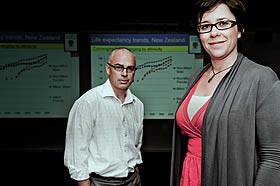

Professor Tony Blakely & Dr Kristie Carter
“We're essentially examining the effect of changes in income and employment in families, how these interact and affect people's health.”
New Zealanders like to believe their country is a place of relative equality; however, recent reports have shown that New Zealand is among the top 10 “most unequal” countries in the developed world in terms of income differentials. What that means, in a more specific sense, is being investigated by a group of University of Otago, Wellington, public health researchers.
The Health Inequalities Research Programme, led by Professor Tony Blakely, is studying new longitudinal data from Statistics New Zealand that, for the first time, details the reasons for significant differences in sub-populations and ethnic groups.
Co-principal investigator Dr Kristie Carter and colleagues have published a number of papers showing increasing inequalities in health and income over the last 25 years using the Census, Statistics New Zealand Life Tables and the longitudinal Survey of Families, Income and Employment (SoFIE), testing assumptions about the impact of inequalities on health and vice versa.
They have examined trends in life expectancy by ethnicity, income and smoking status in New Zealand from 1981 to 2004, revealing that gaps in life expectancy between different ethnic and income groups grew dramatically between 1981 and 1996, before stabilising, but with inequalities remaining in terms of survival and life expectancy.
“There's a widening life expectancy gap between Māori and non-Māori males, increasing from 5.4 years to nine years, and between low-income and high-income males, growing from 4.4 years to 6.5 years. We have also shown that life expectancy in high income Māori males was consistently lower than low income non-Māori males,” she says.
“Surprisingly, the gap in life expectancy between ethnic groups was greatest for never-smokers compared to smokers, indicating that, no matter what your income or ethnicity, current smoking is bad for your health.”
Carter says one of the strengths of SoFIE is the size of the sample, comprising more than 22,000 adults in 2002.
“SoFIE is very important data for this country – a real first – as it enables us to drill down and carry out cause-and-effect analyses which have relevance, not only to New Zealand, but also internationally. We're essentially examining the effect of changes in income and employment in families, how these interact and affect people's health.
“We have asked respondents for consent to link information to hospitalisation and cancer registration so we can look at the impact a major health event has on their lives, their incomes and employment. We can also see what happens when families split up or how changes in social policy, such as Working For Families, have affected income and health,” she explains.
Carter has also been looking at food insecurity – the lack of access to sufficient nutritious food and what is colloquially referred to as “not knowing where your next meal is coming from”.
Analysis of the SoFIE survey shows that 15 per cent of people felt they were food insecure in 2004–2005. This was a time when unemployment was relatively low and when the economy was in the middle of a boom. Carter's research shows that food insecurity is significantly higher amongst females compared to males and is associated with sole parenthood, being Māori, renting, unemployment, poor health and low income.
“More significantly, a second study using SoFIE data looked at the association of food insecurity with psychological distress. It shows a very strong relationship between distress and food insecurity, which is particularly evident with females.”
Carter says these findings provide guidance to policy-makers and researchers overseas because of the strength of the New Zealand data sets, which allows research to be conducted with greater rigour to test the causal associations that lead to inequalities in New Zealand.
Funding
- Health Research Council